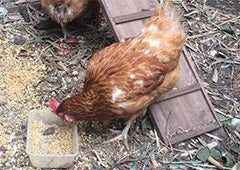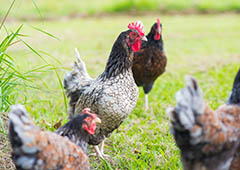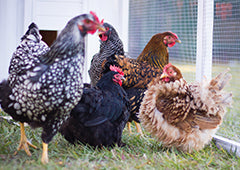Chickens are marvellous creatures, and come pre-programmed with their own quirky methods of keeping disease at bay (anyone fancy a dust bath?) But there are always extra steps you can take to keep your chicks fighting fit and springing off their perch each day. Maintenance is certainly not limited to coop care! Here are some tips to keeping your flock fantastic.
When and how should I worm my chickens?As with other pets, chickens should be wormed to prevent internal creepy crawlies from infecting your precious brood. As for how often, different methods require varying doses. One of the easiest and most affordable options is a liquid wormer, which generally costs less than $20. A few drops into their water once every month is enough to do the trick. There are also natural remedies that can encourage existing worms to vacate the premises and (crushed garlic, apple cider vinegar and pumpkin seeds have proven to be extremely beneficial.
Do I need to vaccinate my chickens?
If your chickens are mainly going to be living in a coop in the backyard, then they should be fine without vaccinations. Chickens are hardy creatures!
If you are getting a large amount of chickens, or they will be potentially mixing with other animals like livestock, it is advisable to get them vaccinated against Marek’s disease. The vaccination can be bought for around $20-$25 dollars if you want to administer it yourself, or a quick trip to the vet will also do the trick. If you've purchased chickens from a retailer or farmer, inquire as to what diseases they've been vaccinated for, as you do not want to double up!
What is moulting?
Moulting is the surprising process where a chicken sheds and re-grows their feathers. The first time you witness your flock molting, it is a bit confronting - the sight of a balding chicken is not the most attractive look! But it’s all a perfectly normal process and they will be sprouting fresh feathers in no time. Take a look at our
What are some other common diseases and how can I prevent them?
There are a number of serious diseases that chickens are particularly susceptible to, but before you start hyperventilating into a paper bag, relax. Each can be easily prevented. It’s just handy to know the warning signs! Salmonella is another common disease that causes symptoms like diarrhoea and laboured breathing - if you think your chick is at risk, probiotics will help combat bad bacteria. Coccidiosis is a disease caused by internal parasites that is easily treated with vaccinations or medicated feed - our First Few Days and Weeks with Baby Chicks article has more information about effectively preventing it.
Giving your flock a helping hand and upping their maintenance routine is a great way to ensure that your chickens continue to thrive and are the happiest hens on the block. Remember to ask your vet for advice if you're unsure of anything to keep your flock fighting fit!



















